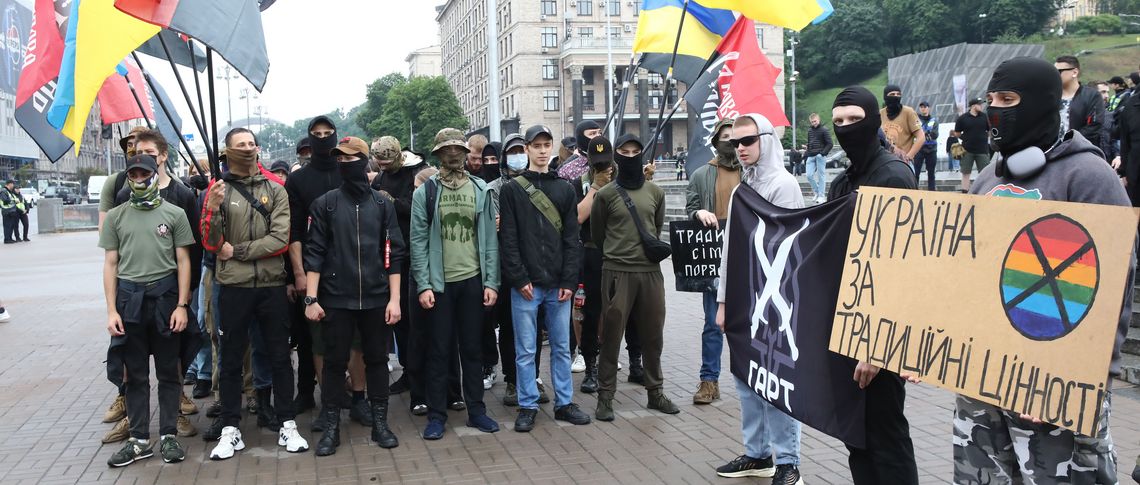The recent confrontation in central Kyiv between participants in the Equality March and supporters of so-called traditional values was yet another manifestation of the tensions that are growing amid a full-scale war. Under the slogans of ‘defending the family’ or ‘national morality’, there is increasingly a hidden language of hatred, intolerance and attempts to impose a single ‘norm’. It is particularly worrying that more and more young people are taking part in such actions, often wearing balaclavas, chanting aggressive slogans and showing a tendency towards confrontation.
In peacetime, such events would provoke heated public debate, but during wartime, they tend to be met with greater public tolerance. And it is precisely this fertile ground that allows a dangerous ‘shift to the right’ to take root, raising the key question: how stable are the democratic foundations of society during wartime, and are we losing a new generation?
Radicalisation in an international context
In times of armed conflict, there is a growing demand for identity, national unity, protection and tradition. But it is precisely these themes that can become tools for manipulating public consciousness and even radicalising it.
Incidentally, Russian propaganda has been using the image of ‘Ukrainian Nazism’ as a central narrative for years, both for domestic consumption and for foreign audiences. Torchlight marches, radical slogans and symbols are visual triggers that are ideal for the Kremlin’s mouthpieces.
It is no secret that Russian special services have worked with far-right networks in Europe and, probably, also in Ukraine at various times. At the same time, it should be recognised that radicalisation, especially among young people, is not a purely Ukrainian phenomenon. Similar processes can be observed in Western democracies, from the United States to France, from Germany to Italy.
The feeling of losing control over the value system becomes a catalyst for mobilisation, and it is precisely this emotion that is increasingly being picked up by youth communities.
Under the guise of ‘defending traditions’, xenophobic, ultra-conservative and anti-democratic messages are being promoted. Elon Musk is one of the most prominent examples. Through X, he spreads far-right rhetoric, attacking minorities, women and climate activists. In this way, he is trying to create a ‘new norm’ of resistance to anything that does not fit into his idea of traditional values.
All this is happening against a backdrop of profound social change.
The rise of traditionalist sentiments in these countries has also been a reaction by part of society to a fairly radical shift in the general ideological framework, notably in the field of education. In particular, this refers to the increased emphasis on transgender issues, changes in school curricula and the practice of including new gender identities, which have not always been accompanied by a broad public dialogue. This has provoked resistance from parent communities, religious organisations and churches, which have begun to perceive the new ultra-liberal norm as a threat to their own values and their right to raise their children.
The reaction to such changes is not always radical, but in a polarised environment, it is the radical voices that become the loudest.
The feeling of losing control over the value system becomes a catalyst for mobilisation, and it is precisely this emotion that is increasingly being picked up by youth communities. Ukraine must take this international context into account, not to borrow or justify, but to prevent its own risks.
Values in wartimes
Because in wartime, another powerful factor is added to the existing experience of a traumatised society: a void of values and ideology. Young people – participants in combat operations, volunteer initiatives, youth projects – are often left without meaningful support. Their condition during the war, the loss of loved ones, fatigue, social tension and lack of trust in the state can lead to a demand for something new, valuable and fair, or for a ‘strong hand’, order and radicalism.
If this demand cannot be met with meaningful, democratically justified forms of engagement, it may be hijacked by forces offering an illusory order under the guise of radical rhetoric.
This is precisely why value-based and ideological education cannot be reduced to imposing a single ‘correct’ vision. Instead, it must combine healthy patriotism with tolerance, openness and respect for pluralism of opinions and views.
If today’s youth see that freedom is not a weakness, that democracy is participation, that leadership is trust, then Ukraine will have a chance at a just and inclusive recovery.
Patriotism is first and foremost love for one’s country, not the cultivation of ‘exclusivity’. It should not be equated solely with nationalism, especially if the latter excludes or marginalises those who think differently. Ukrainian defenders are fighting today for the right to live in a free, democratic society, and this freedom begins now: in the school classroom, the university lecture hall, and public discourse.
Education is one of the key tools for protecting society from radicalisation. It is not just about knowledge — it is about experience: participation, co-creation, discussion. Young people need space for identity and autonomy — through debates, simulations, civic education, volunteer programmes and ‘living libraries’. But equally important is the example of real, progressive leadership.
Society needs politicians who do not trade in fear, but speak the language of trust, dignity and equality. These could be local councillors promoting transparency and dialogue, or ministers and mayors implementing inclusive approaches in education, culture and social policy. These are community leaders who do not impose their own interests, but work with local groups (Hromoda), veterans, displaced persons and young people.
A policy of trust also means supporting the mental health of teenagers, training school teachers in human rights, and working systematically on critical thinking and non-discrimination. Rebuilding Ukraine is not just about infrastructure. It is about who we are, how we think and who we recognise as authorities.
If today’s youth see that freedom is not a weakness but a value, that democracy is participation not rhetoric, that leadership is trust not coercion, then Ukraine will have a chance at a just and inclusive recovery.






